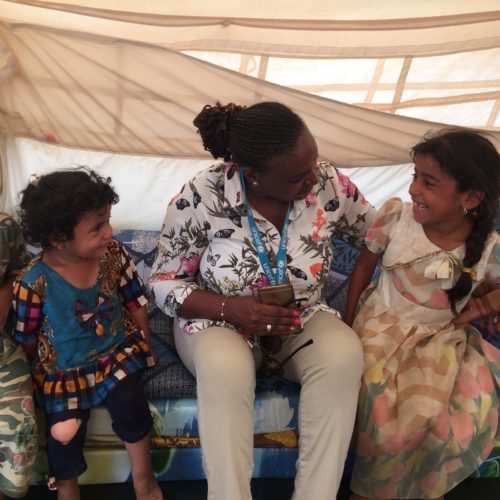This website uses cookies so that we can provide you with the best user experience possible. Cookie information is stored in your browser and performs functions such as recognising you when you return to our website and helping our team to understand which sections of the website you find most interesting and useful.
Hamida Ramadhani – Deputy Representative in Iraq
For every child, hope.
 What is one of your memorable experiences working for UNICEF?
What is one of your memorable experiences working for UNICEF?
Two years ago I was working as a Deputy Representative in Syria and parents from a part of a country that was under the control of anti-government groups approached UNICEF via our partners with one request.
“We need your help to get our daughters out of here so that they can go sit for the secondary schools’ national exams in [then government controlled] Aleppo,” they said.
Girls in this hard to reach area were unable to go to schools due to the restrictions imposed by the armed groups, but a group of 50 girls studied at home and their parents were willing to risk their lives to cross dangerous checkpoints in order to get them to where they needed to sit for exams and pursue higher education.
As a mother, I was incredibly moved by the parents’ request and the value they placed on girls’ education.
Working with our partners we managed to support these girls with accommodation, extra tuition and other needs when they reached Aleppo. I cried when I met them and they told me how hard they had been studying at home and how important these exams were to them. I will never forget these brave girls and their parents. They are a constant reminder that we must not take anything for granted.
What advice do you have for women currently in an emergency context?
My advice is to keep the connection with loved one at home alive. Technology has made this easier than ever before. Knowing that my family are just one call or one WhatsApp message away reduces feelings of isolation and loneliness. I could not do what I do without the support of my spouse and family. I talk to them about my work and the people I meet so that they feel like they are a part of my daily life irrespective of whether I am in Iraq, Syria, Afghanistan or Somalia.
What are the main benefits/challenges of working in an emergency context?
There are a lot of challenges. The needs of vulnerable children and their families are often acute and urgent and we work long hours, including weekends to support a lifesaving response. Seeing the immediate results and knowing that we delivered safe drinking water to a community that had no water and the education of children is maintained during an emergency is rewarding and inspiring.
What role does diversity play in working in an emergency context?
Diversity in all its shapes and forms are very important. Having a right balance people of different backgrounds, gender and ethnicity add value to an emergency operation. I’ve been in situations where women who have suffered from gender-based violence felt more comfortable talking to me about their issues and needs than they did with male colleagues. They could relate to me as a woman and trusted me to take up their cause.
